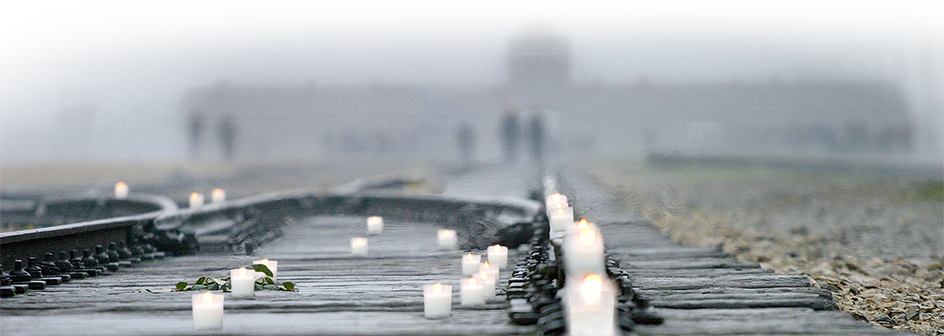

“Men to the left! Women to the right!”
These eight words would haunt many Holocaust survivors for the rest of their lives. Upon arriving in cattle trucks at Auschwitz, Poland, the deported Jews were put through a selection process right on the unloading platforms that would determine whether they would work or die. In an instant, families were permanently torn apart. There was no time to kiss, to hug, or to say goodbye. On average, only one out of five deportees was selected for forced labour. The rest were taken to gas chambers for summary execution. This is just one gruesome snapshot of the Holocaust, which claimed the lives of approximately six million Jews and millions of others during the Nazis’ rule over Germany and much of Europe.
In 2005, the United Nations General Assembly designated 27 January, the day of the liberation of Auschwitz concentration and extermination camp, as International Holocaust Remembrance Day. But well before that, Jewish teens had gathered every year in Auschwitz since 1988 for a three-kilometre silent march to Birkenau as a tribute to the victims of the Holocaust. In this journey called the March of the Living, tens of thousands of participants march with the survivors and listen to their stories. In this way they become witnesses to the genocide and help carry the torch of memory for the ageing survivors.
Commemoration days and activities are but one of the many ways to keep people remembering the past. Visits to historic sites and museums in person, for instance, create immersive and poignant experiences that will last for a lifetime. The Auschwitz-Birkenau State Museum was officially opened at the concentration camp site in 1947. Almost 80 years have passed since the last survivor was liberated, yet even on a summer day there is still a palpable bleakness in the air, making the Auschwitz-Birkenau tour chilling and painful for both visitors and guide-educators. About 70 kilometres from the death camp, Oskar Schindler’s Enamel Factory now houses a branch of the Kraków Historical Museum and bears testimony to the Nazis’ occupation. One cannot help recalling scenes from Steven Spielberg’s masterpiece Schindler’s List upon entering the office of the man who saved over 1,300 Jews. The sight of his writing desk and the floor-to-ceiling showcase of enamelware manufactured by the factory workers makes the catastrophic past tangible and impossible to forget.
When faced with the horrendous memory of the past, some may refuse to look back or simply choose to deny it. For those who have survived the Holocaust, their struggle did not end with the liberation from concentration and extermination camps. They are engaged in a never-ending crusade—the fight for remembrance. Primo Levi, an Italian Jewish chemist, was arrested and deported to Auschwitz in 1944. After returning to Italy, he felt more than ever compelled to write about what had happened. In a calm and sober voice, his book If This Is a Man recounts what he went through and explores humanity amid inhumanity. He writes, “For the survivors, remembering is a duty. They do not want to forget, and above all they do not want the world to forget, because they understand that their experiences were not meaningless.”
Elie Wiesel, a Romanian Jewish journalist, also felt the urge to commit his traumatic past to paper. Night, his autobiographical novel, has been translated into over 30 languages and remains one of the most iconic literary expressions of the Holocaust. Giving an account of his ordeals, the book addresses philosophical questions about the Holocaust and human nature. Wiesel was awarded the Nobel Peace Prize in 1986 for being a messenger of peace, atonement and dignity. In his acceptance speech, Wiesel said he had tried to “keep memory alive” and “fight those who would forget”. As for those who perished, he declared, “We could not prevent their deaths the first time, but if we forget them they will be killed a second time. And this time, it will be our responsibility.”
Literature is certainly a powerful tool to introduce a new generation to one of the darkest chapters in human history, but survivors have other ways to bear witness for the dead and for the living. Edward Mosberg, who saw Holocaust education as his moral mission, often donned a reproduction of his striped concentration camp uniform with matching cap in public, and wore a bracelet showing his prisoner number every day. He said, “As long as I live I have to go and talk about this so the Holocaust will never be forgotten.” The old man kept his words. He appeared in documentaries, gave talks, joined the March of the Living, and remained active in Holocaust commemoration until he died at the age of 96.
January 2024 marks the 79th anniversary of the liberation of Auschwitz. On the International Holocaust Remembrance Day, wreaths will be laid and prayers will be offered to the victims. We might never be able to fully fathom the horror of the Holocaust or understand the despair of those who suffered. Yet, it is important for us to refresh our memory of their suffering. As the oft-quoted aphorism goes, “Those who cannot remember the past are condemned to repeat it.” With a wave of hatred, xenophobia and racism hitting the world, it is more pertinent than ever to remember what happened. Perhaps only when we and the world remember the past can we learn from history.











